Recent Posts
Water Damage Restoration: DIY vs. Professional Services – What’s Best for You?
3/12/2025 (Permalink)
 Water damage can happen unexpectedly in Chester County, PA, whether from a burst pipe, appliance malfunction, or heavy rain.
Water damage can happen unexpectedly in Chester County, PA, whether from a burst pipe, appliance malfunction, or heavy rain.
When faced with water intrusion, many homeowners wonder: Should I handle the cleanup myself or call in professionals?
While some minor water issues can be addressed with DIY methods, larger or more severe water damage often requires professional water damage restoration to prevent further structural issues. At SERVPRO®, we specialize in comprehensive water damage restoration, ensuring homes and businesses recover quickly and efficiently.
In this guide, we’ll explore the key differences between DIY vs. professional water damage restoration, helping you determine the best course of action for your situation.
DIY Water Damage Restoration: When Can You Handle It Yourself?
DIY water damage restoration may seem like a cost-effective and convenient solution, especially for small leaks or minor spills. In certain cases, a homeowner with the right tools and knowledge can manage the drying and cleanup process.
When DIY Restoration Might Be an Option:
- The water source is clean (e.g., a supply line leak, not contaminated water).
- The affected area is small (less than 10 square feet).
- No structural materials (drywall, flooring, insulation) are heavily saturated.
- You have proper drying equipment (fans, dehumidifiers, wet/dry vac).
- You can monitor moisture levels to ensure thorough drying.
DIY Water Damage Restoration Steps:
- Stop the Source – Turn off water supply lines if necessary.
- Remove Excess Water – Use towels, mops, or a wet/dry vacuum.
- Improve Airflow – Open windows, use fans, and place dehumidifiers.
- Monitor Drying Progress – Check for lingering moisture with a moisture meter.
- Inspect for Damage – Ensure walls, floors, and ceilings aren’t compromised.
However, while DIY methods can be effective for minor water incidents, larger-scale water damage is more complex and requires professional intervention.
Why Professional Water Damage Restoration Is Often Necessary
For moderate to severe water damage, SERVPRO's professional water damage restoration services ensure complete moisture removal, structural drying, and restoration of affected areas.
When You Should Call the Professionals:
- Water damage affects multiple rooms or floors.
- The source of water is unknown or hard to access.
- The water has been sitting for over 24 hours.
- Drywall, flooring, or insulation is soaked.
- You don’t have access to industrial-grade drying equipment.
How Professional Water Damage Restoration Works:
- Assessment & Inspection – Technicians use moisture meters and infrared cameras to detect hidden moisture.
- Water Extraction – High-powered pumps remove standing water quickly.
- Drying & Dehumidification – Industrial-strength air movers and dehumidifiers eliminate residual moisture.
- Cleaning & Restoration – Damaged materials are repaired or replaced, restoring the property to its original condition.
With SERVPRO’s professional expertise, property owners can have peace of mind knowing their home is completely dried and restored.
DIY vs. Professional Water Damage Restoration: Key Differences
Factor
DIY Water Damage Restoration
Professional Water Damage Restoration
Equipment Used
Household fans, wet/dry vacuums
Industrial-grade air movers, dehumidifiers, pumps
Speed of Drying
Slower drying times
Faster, more effective drying
Hidden Moisture Detection
No specialized tools
Advanced moisture meters and infrared cameras
Risk of Structural Damage
Higher (if moisture isn't fully removed)
Lower (thorough drying prevents further issues)
Time & Effort
Labor-intensive for homeowners
Handled by trained professionals
While DIY methods may work for minor spills, professional water damage restoration ensures complete moisture removal, reducing long-term risks.
FAQs About DIY vs. Professional Water Damage Restoration
How do I know if my water damage requires professional restoration?
If water has spread beyond a small area, has saturated walls or flooring, or has been sitting for over 24 hours, professional services are recommended to prevent further damage.
Can I rent equipment and dry my home myself?
While rental equipment like dehumidifiers and fans are available, professionals use high-powered commercial-grade equipment designed for deep water extraction and drying.
Will professional restoration save me money in the long run?
Yes. A thorough drying process prevents costly repairs down the road, such as warped flooring, weakened drywall, and structural damage.
How fast should I act after water damage occurs?
Immediately! The longer water sits, the more damage it causes. SERVPRO is available 24/7 to respond to emergencies and start the restoration process.
SERVPRO: Your Trusted Experts for Water Damage Restoration
Water damage can escalate quickly, leading to costly repairs if not handled correctly. While small water incidents may be manageable with DIY efforts, professional restoration ensures complete drying, faster recovery, and long-term property protection.
For expert water damage restoration, contact SERVPRO today—we’re here to restore your home or business efficiently and effectively!
How to Safely Store Flammable Chemicals and Materials: Expert Tips to Prevent Fires
12/18/2024 (Permalink)
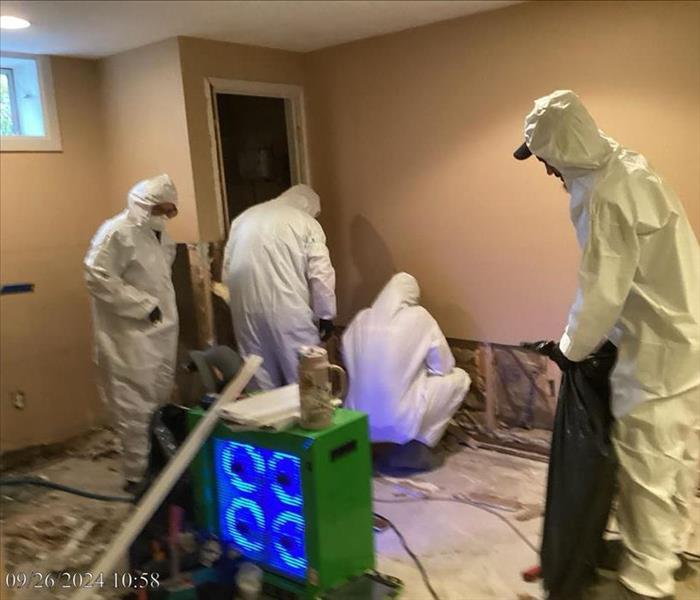 Discuss expert insights on how to safely store flammable chemicals and materials to minimize fire risks.
Discuss expert insights on how to safely store flammable chemicals and materials to minimize fire risks.
Proper storage of flammable chemicals and materials is essential for preventing fires in both residential and commercial settings. Whether you’re managing a small workshop or a large industrial facility, failing to store these items safely can lead to dangerous situations. At SERVPRO®, we understand the critical role fire prevention plays in protecting homes, businesses, and lives. In this blog, we’ll discuss expert insights on how to safely store flammable chemicals and materials to minimize fire risks.
The Importance of Safe Storage for Flammable Materials
Flammable chemicals and materials can ignite easily if exposed to heat, sparks, or open flames. Without proper storage, these substances pose a significant risk of fire. According to the National Fire Protection Association (NFPA), between 2014 and 2018, an average of 1,400 structure fires involving flammable or combustible liquids occurred annually in the U.S., causing millions in property damage. You can find more fire safety statistics from the NFPA here.
Key Guidelines for Safely Storing Flammable Chemicals and Materials
Storing flammable materials safely requires careful planning and adherence to safety protocols. Below are some expert tips to ensure that your flammable materials are stored in a manner that reduces the risk of fire.
1. Use Approved Containers
One of the most critical steps in safely storing flammable chemicals is ensuring they are kept in appropriate containers. Containers must be made of fire-resistant materials and specifically designed for the chemicals they hold. For example, metal containers are often used to store gasoline, while chemical-resistant plastic containers are suitable for certain solvents and acids.
- Label all containers clearly: Make sure all containers are properly labeled with the contents and hazard warnings to ensure safe handling and avoid mixing incompatible materials.
- Check for leaks: Regularly inspect containers for any signs of damage, rust, or leaks, which can increase fire risks.
2. Store in a Well-Ventilated Area
Flammable chemicals can release vapors that are hazardous and potentially combustible. To prevent vapor buildup, always store these materials in a well-ventilated area. Ensure that the storage space has proper airflow and is free of potential ignition sources, such as electrical outlets or open flames.
- Keep storage away from direct sunlight: Heat sources, including sunlight, can increase the temperature of flammable materials, causing them to ignite or release harmful vapors.
3. Use Flame-Resistant Storage Cabinets
For businesses or facilities that handle large quantities of flammable chemicals, investing in flame-resistant storage cabinets is essential. These cabinets are specially designed to contain flammable liquids and protect them from external heat sources.
- Store like chemicals together: Group flammable materials by type and ensure that incompatible substances (such as oxidizers and flammables) are stored separately to prevent dangerous chemical reactions.
- Lock storage cabinets: Keep storage cabinets locked to restrict access and reduce the chance of accidental spills or fires.
4. Maintain Proper Distances from Ignition Sources
Flammable chemicals should always be stored at a safe distance from any potential ignition sources, including electrical equipment, machinery, heaters, and open flames. Be mindful of local building codes and NFPA regulations, which often specify minimum distances between flammable material storage and ignition sources.
- Install fire extinguishers nearby: Place fire extinguishers near flammable material storage areas to ensure quick access in the event of a fire. Make sure that employees or household members know how to use fire extinguishers properly.
5. Store Flammable Waste Safely
Flammable waste, such as rags soaked in solvents or used chemicals, also presents a fire hazard. Improper disposal of this waste can lead to spontaneous combustion. To store flammable waste safely:
- Use metal waste bins with self-closing lids: These bins are designed to contain flammable waste and minimize the risk of combustion.
- Dispose of waste promptly: Do not allow flammable waste to accumulate. Arrange for regular disposal through a licensed waste management company.
6. Follow OSHA and NFPA Guidelines
Both the Occupational Safety and Health Administration (OSHA) and the NFPA provide detailed regulations and best practices for the safe handling and storage of flammable materials. Regularly review and implement these guidelines in your workplace or home to ensure compliance and enhance fire safety.
- Provide employee training: For businesses, ensure all employees are trained in the safe handling and storage of flammable materials. This includes understanding hazard labels, using appropriate personal protective equipment (PPE), and knowing emergency procedures.
Conclusion
Proper storage of flammable chemicals and materials is vital to reducing the risk of fires in both residential and commercial settings. By using approved containers, storing materials in well-ventilated areas, and following fire safety guidelines, you can protect your property from potential fire hazards. At SERVPRO, we are committed to helping homeowners and businesses safeguard their spaces with expert fire prevention advice and fire damage restoration services.
Take proactive steps to protect your property from fire risks by ensuring your flammable materials are stored safely and securely. For more fire safety tips or assistance with fire damage restoration, contact SERVPRO today!
Mold in HVAC Ducts: Causes and Expert Solutions for Prevention
11/13/2024 (Permalink)
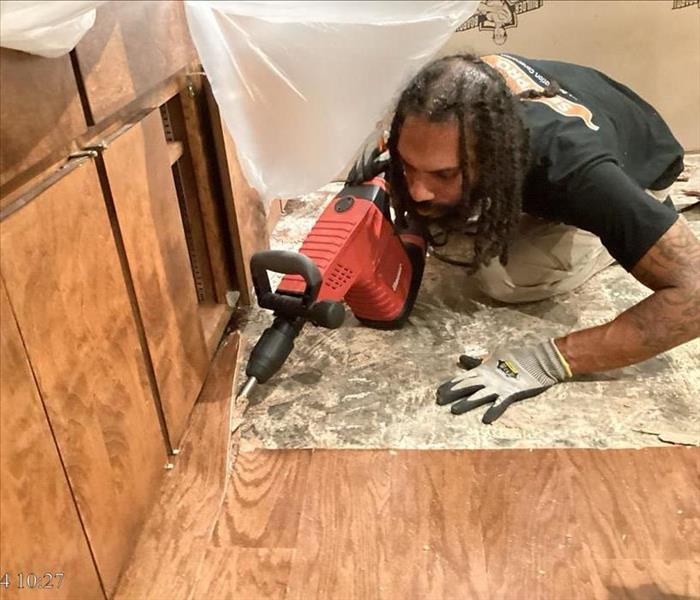 In this blog, we’ll explore the main causes of mold in HVAC ducts and provide expert solutions to keep your system mold-free.
In this blog, we’ll explore the main causes of mold in HVAC ducts and provide expert solutions to keep your system mold-free.
Mold growth in HVAC ducts is a common but serious issue that can significantly impact your home's comfort and safety in Chester County, PA. If left unaddressed, mold in your ducts can reduce the efficiency of your HVAC system and require costly repairs. At SERVPRO®, we understand how crucial it is to tackle mold problems early and effectively. In this blog, we’ll explore the main causes of mold in HVAC ducts and provide expert solutions to keep your system mold-free.
What Causes Mold in HVAC Ducts?
Mold thrives in environments where moisture and organic material are present. Unfortunately, HVAC systems create the perfect conditions for mold growth, particularly when they aren’t properly maintained. Here are the primary causes of mold in HVAC ducts:
1. Excess Moisture
Moisture is the leading cause of mold in HVAC ducts. When your system cools the air, condensation naturally forms on the coils. If there’s excessive humidity in your home or poor ventilation, this moisture may not dry properly, creating a breeding ground for mold. In fact, mold requires only 48 hours of moisture exposure to begin growing.
2. Leaky Ducts
Leaks in your HVAC ductwork can introduce moisture and dirt, both of which contribute to mold growth. Leaks allow humid air from outside or unconditioned spaces like attics and basements to enter the system, which can lead to condensation buildup.
3. Clogged or Dirty Air Filters
Air filters play an important role in keeping contaminants out of your HVAC system. When they become clogged with dust and debris, airflow is restricted, leading to potential moisture buildup inside the ducts. Dirty filters can also allow mold spores to enter the system and circulate through your home.
4. Poor System Maintenance
Routine maintenance is essential for keeping your HVAC system in good condition. Neglecting regular cleaning, inspection, and service can result in dirty coils, leaky ducts, and other issues that promote mold growth.
How to Prevent Mold in HVAC Ducts
The good news is that preventing mold in your HVAC ducts is possible with proactive measures. Below are the expert-recommended steps to prevent mold growth in your system:
1. Regular HVAC Maintenance
Schedule regular inspections and cleanings of your HVAC system. A well-maintained system is less likely to develop moisture issues that lead to mold. Be sure to have the coils, drip pans, and ducts professionally cleaned to remove dirt and moisture.
2. Install a Dehumidifier
In areas with high humidity, installing a whole-home dehumidifier can reduce excess moisture in the air and prevent condensation buildup within your HVAC system. This step is especially important if you live in a humid climate.
3. Seal and Insulate Ducts
Ensuring your ductwork is properly sealed and insulated can prevent leaks and minimize moisture from entering the system. If you suspect any leaks, have them professionally sealed to avoid condensation and mold growth.
4. Replace Air Filters Regularly
Make sure to replace your air filters every 1 to 3 months, depending on the type of filter and your household needs. This prevents mold spores from entering the system and keeps airflow unrestricted.
5. Use UV Lamps
Installing UV lamps inside your HVAC system can help kill mold spores and bacteria before they spread. These lamps are especially effective when placed near the evaporator coil, where moisture tends to accumulate.
Professional Mold Remediation for HVAC Systems
If mold has already developed in your HVAC ducts, it’s essential to call in professionals for remediation. At SERVPRO, we use advanced techniques and equipment to remove mold and prevent future growth. This includes cleaning the affected ducts, applying mold inhibitors, and identifying the source of moisture to ensure it doesn’t return.
Why Mold in HVAC Ducts Should Be Addressed Quickly
Mold in HVAC ducts can impact the efficiency of your heating and cooling system. According to a report by the Environmental Protection Agency (EPA), dirty HVAC systems can reduce efficiency by up to 25 percent due to increased airflow resistance and reduced heat exchange efficiency. By addressing mold issues early, you can prevent costly energy bills and the need for extensive repairs.
At SERVPRO, we are dedicated to providing expert mold remediation services for homeowners. If you suspect mold in your HVAC ducts, don't wait. Contact us today for professional inspection and remediation services to ensure your system is running at peak performance and free from mold.
Understanding Your Insurance Policy: What to Look for in Water Damage Coverage
10/15/2024 (Permalink)
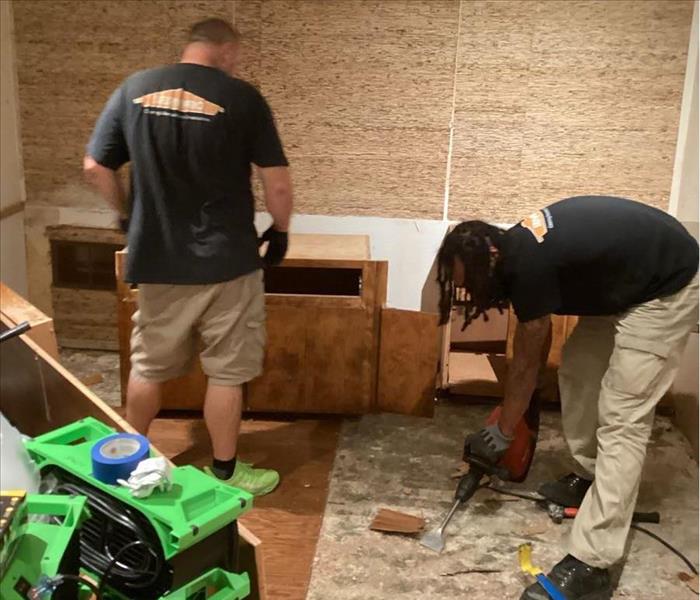 For professional water damage restoration services, contact SERVPRO of North East Chester County today!
For professional water damage restoration services, contact SERVPRO of North East Chester County today!
Water damage is one of the most common issues homeowners face, and understanding your insurance policy is crucial for ensuring you have the right coverage. This blog will provide tips on what homeowners in Chester County, PA, and beyond should know about their insurance policies regarding water damage.
Types of Water Damage Coverage
Not all water damage is covered under standard homeowner's insurance policies. It's important to understand the different types of water damage and what your policy includes.
- Sudden and Accidental Damage
Most standard homeowner's insurance policies cover sudden and accidental water damage. This includes incidents such as burst pipes, ruptured water heaters, and overflows from appliances. It's essential to check your policy to confirm these events are covered.
- Gradual Damage
Gradual damage, such as water damage from a slow leak, is typically not covered by standard policies. Insurance companies consider this type of damage to be preventable through regular maintenance. Be sure to inspect your home regularly to catch these issues early.
- Flood Damage
Standard homeowner's insurance policies do not cover flood damage. If you live in a flood-prone area, you will need to purchase a separate flood insurance policy. The National Flood Insurance Program (NFIP) offers coverage, or you can seek private flood insurance.
- Sewer Backup
Water damage caused by a sewer backup is not usually included in standard policies, but you can add this coverage as an endorsement. Considering the potential for extensive damage, this additional coverage can be a worthwhile investment.
Important Policy Details to Review
When reviewing your insurance policy, there are several important details to pay attention to regarding water damage coverage.
- Policy Limits
Your policy will have limits on the amount it will pay out for water damage claims. Ensure these limits are sufficient to cover potential repair and replacement costs in your home. If not, consider increasing your coverage.
- Deductibles
The deductible is the amount you must pay out of pocket before your insurance kicks in. Check the deductible for water damage claims specifically, as it may differ from the general deductible on your policy.
- Exclusions
Review your policy for any exclusions related to water damage. These are specific situations where your insurance will not provide coverage. Understanding these exclusions can help you take preventive measures and consider additional endorsements if necessary.
- Claim Process
Familiarize yourself with the process for filing a water damage claim. Knowing what documentation is required and the steps involved can expedite the process if you ever need to file a claim.
Why Understanding Your Policy Matters
Having the right water damage coverage can save you a ton of stress and financial strain in the event of a disaster. According to the Insurance Information Institute, water damage and freezing account for nearly 29% of all homeowner insurance claims. Making sure you have adequate coverage can provide peace of mind and protect your investment in your home.
Final Thoughts
Understanding your insurance policy and making sure you have the right coverage for water damage is crucial for homeowners in Chester County, PA, and beyond. By reviewing your policy details and performing regular maintenance, you can protect your home and be prepared for any water damage disaster.
For professional water damage restoration services, contact SERVPRO of North East Chester County. Our team is Here to Help® you recover quickly and efficiently from any water damage disaster.
Flooded Basements: How Northeast Homeowners Can Recover Quickly and Safely
9/11/2024 (Permalink)
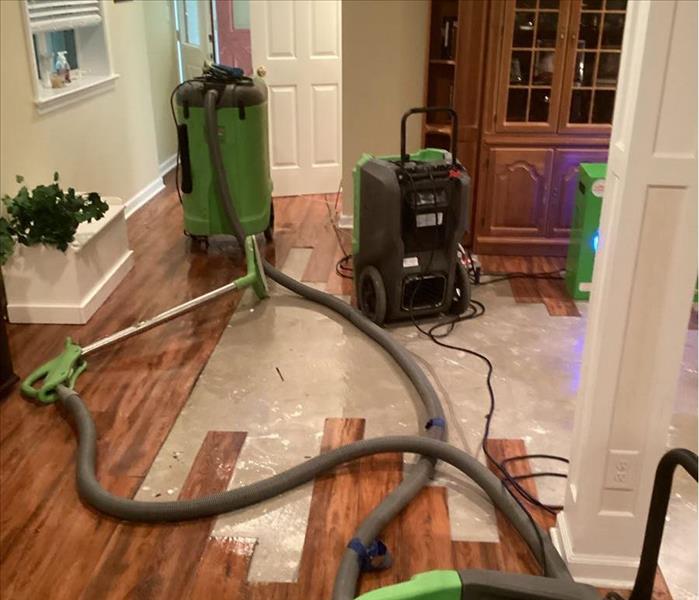 This blog will guide you through essential tips and strategies to manage and recover from basement flooding.
This blog will guide you through essential tips and strategies to manage and recover from basement flooding.
Flooded basements are a common issue for homeowners in the Northeast, particularly in states like Pennsylvania where heavy rainfall and storms are frequent. Dealing with a flooded basement can be overwhelming, but with the right steps, you can recover quickly and safely. This blog will guide you through essential tips and strategies to manage and recover from basement flooding, backed by relevant statistics and expert advice.
Understanding the Impact: Flooded Basements in Pennsylvania
Flooding is a significant problem in Pennsylvania, with thousands of homeowners affected annually. According to the Pennsylvania Emergency Management Agency (PEMA), in 2022 alone, more than 5,000 homes reported basement flooding due to severe weather conditions.
Immediate Steps to Take When Your Basement Floods
- Ensure Safety First
- Before entering a flooded basement, ensure that all electrical and gas supplies are turned off. Water and electricity are a dangerous mix, and your safety should be the top priority.
- Identify the Source of Flooding
- Determine whether the flooding is due to heavy rain, a burst pipe, or sewage backup. Identifying the source will help in implementing the correct recovery strategy.
- Remove Water Safely
- Use a sump pump, wet/dry vacuum, or call a professional water removal service to extract the water from your basement. Avoid using standard household vacuums or other electrical appliances in wet areas.
Drying and Cleaning Your Basement
- Ventilate the Area
- Open windows and doors to allow fresh air to circulate. Use fans and dehumidifiers to speed up the drying process and reduce moisture levels.
- Remove Damaged Items
- Take out any water-damaged furniture, carpets, and other items. Items soaked in water for an extended period may need to be discarded to prevent mold growth.
- Clean and Disinfect
- Thoroughly clean and disinfect all surfaces to prevent mold and mildew. Use appropriate cleaning agents and wear protective gear to avoid direct contact with contaminated water.
Preventing Future Basement Flooding
- Install a Sump Pump
- A sump pump can be an effective tool in preventing future basement flooding. Ensure it is properly maintained and consider having a backup power source.
- Seal Cracks and Gaps
- Inspect your basement walls and foundation for cracks and gaps. Seal any openings to prevent water from seeping in during heavy rains.
- Maintain Gutters and Downspouts
- Regularly clean and maintain gutters and downspouts to ensure they direct water away from your home. Consider extending downspouts to divert water further from the foundation.
Professional Help and Restoration Services
Recovering from a flooded basement can be a daunting task, and professional help can make a significant difference. SERVPRO® offers comprehensive water damage restoration services, from water extraction and drying to cleaning and mold remediation. Our team of experts is equipped to handle the complexities of basement flooding, ensuring your home is restored to its pre-flood condition.
Flooded basements are a serious concern for Northeast homeowners, but with prompt action and the right measures, recovery is possible. Stay informed, stay prepared, and remember that professional help is just a call away.
For more information and professional assistance in basement flooding recovery, contact SERVPRO today.
Residential vs. Commercial Fire Damage Restoration: Key Differences Explained
8/14/2024 (Permalink)
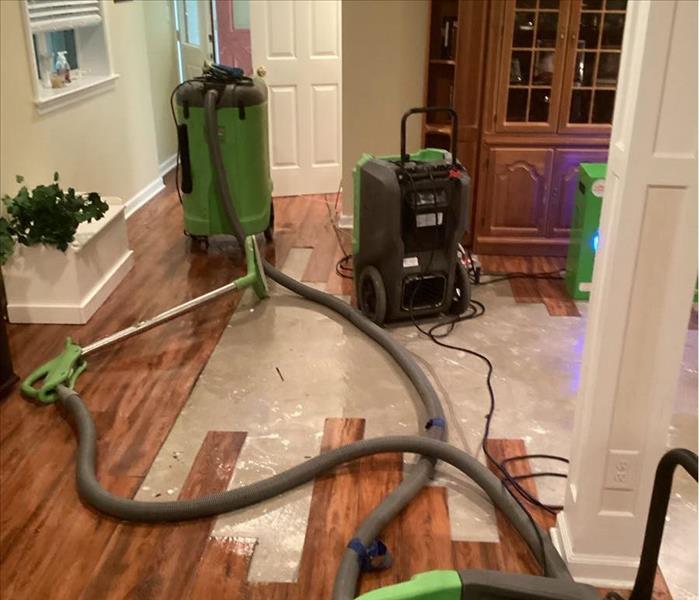 We delve into the key distinctions between fire damage restoration for residential homes and commercial properties.
We delve into the key distinctions between fire damage restoration for residential homes and commercial properties.
Fire damage restoration is a complex process that requires expertise and precision. Whether the fire occurs in a home or a commercial property, the approach to restoration varies significantly. Understanding these differences is crucial for effective recovery. In this blog, we’ll delve into the key distinctions between fire damage restoration for residential homes and commercial properties.
Understanding the Scope of Damage
Residential Properties
Fire damage in residential properties typically involves smaller areas compared to commercial buildings. Homes usually have less complex systems, making the restoration process more straightforward. The focus is often on restoring living spaces, personal belongings, and ensuring the environment is safe for inhabitants.
Commercial Properties
In contrast, commercial properties often experience more extensive fire damage. These buildings can have larger square footage and complex infrastructures, including advanced electrical systems, HVAC units, and specialized equipment. The restoration process for commercial properties is more intricate, requiring specialized knowledge and equipment to address the damage comprehensively.
Restoration Timeline and Processes
Homes
The restoration timeline for residential properties is generally shorter. Fire damage restoration in homes often includes tasks such as debris removal, cleaning soot and smoke residues, and repairing structural damage. Due to the smaller scale, these tasks can be completed more quickly, allowing families to return to their normal lives sooner.
Commercial Buildings
Commercial fire damage restoration is a more prolonged process due to the scale and complexity of the damage. Businesses must also consider additional factors like minimizing downtime and complying with regulatory standards. Restoration companies often work around the clock to ensure businesses can resume operations as soon as possible, involving tasks such as large-scale debris removal, deep cleaning, and extensive repairs.
Compliance and Safety Standards
Residential Properties
In homes, safety standards are primarily concerned with making the environment habitable again. This includes ensuring air quality, removing hazardous materials, and repairing structural elements to prevent future risks. Homeowners typically deal with local building codes and insurance requirements.
Commercial Properties
Commercial properties must adhere to stringent safety and compliance standards. Restoration must align with industry-specific regulations, including fire safety codes, occupational health and safety regulations, and environmental standards. This often necessitates collaboration with multiple agencies and adherence to rigorous documentation and reporting processes.
Insurance and Cost Considerations
Homes
Insurance claims for residential fire damage are generally more straightforward. Homeowners' policies usually cover a wide range of damages, and the costs involved are typically lower compared to commercial properties. Restoration companies assist homeowners in navigating the claims process to ensure fair compensation.
Commercial Buildings
Commercial fire damage claims can be more complex due to the higher value of assets and more extensive coverage requirements. Business interruption insurance, specialized equipment, and inventory losses are additional factors that influence the cost and claims process. Restoration companies need to have a thorough understanding of commercial insurance policies to support businesses effectively.
Understanding the differences in fire damage restoration for homes versus commercial properties is essential for effective recovery. Each requires tailored approaches, specialized knowledge, and careful planning. At SERVPRO®, we are equipped to handle both residential and commercial fire damage restoration with the expertise and efficiency needed to restore normalcy.
By recognizing these distinctions, we can ensure a smoother, faster, and more comprehensive restoration process for all our clients.
Recognizing the Telltale Signs of Mold in Your Home
8/7/2024 (Permalink)
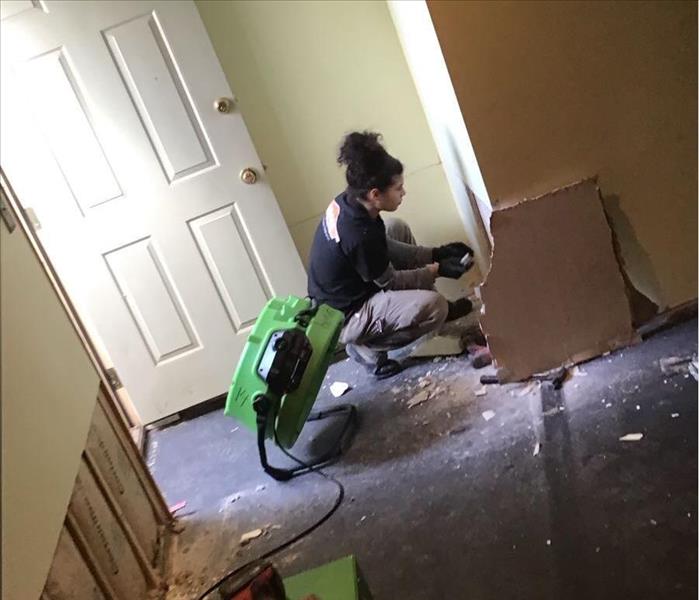 Trust the Pro's with mold remediation! Here are some key indicators that you may have a mold issue in your home:
Trust the Pro's with mold remediation! Here are some key indicators that you may have a mold issue in your home:
As homeowners, we strive to maintain a good environment for ourselves and our loved ones. However, there are certain issues that can arise unnoticed, potentially compromising the integrity of our homes and our personal belongings. One such issue is mold.
Mold is a type of fungus that thrives in damp and humid environments, making our homes susceptible to its growth, especially in areas like bathrooms, kitchens, basements, and attics. While mold can sometimes be visible, it often lurks in hidden corners, making it essential to be aware of the signs that indicate its presence. Here are some key indicators that you may have a mold issue in your home:
- Visible Mold Growth: The most obvious sign of a mold problem is the presence of visible mold growth. Mold can appear in various colors, including black, green, or white, and may resemble spots, patches, or clusters. Pay close attention to areas such as walls, ceilings, floors, and around windows and doors.
- Musty Odor: Mold emits a distinct musty odor that is often described as earthy or stale. If you notice a lingering smell that you can't seem to get rid of, it could be a sign of hidden mold growth behind walls, under flooring, or in other concealed spaces.
- Water Damage: Any past or present water damage in your home, such as leaks, flooding, or water stains, can create the perfect conditions for mold growth. Even if the water damage has been addressed, moisture may still linger in affected areas, providing an ideal environment for mold spores to thrive.
- Allergic Reactions: Mold can trigger allergic reactions in some individuals, causing symptoms such as sneezing, coughing, itchy eyes, and respiratory issues. If you or your family members experience these symptoms indoors but not outdoors, it could indicate the presence of mold.
- Peeling or Discoloration: Peeling paint, wallpaper, or drywall, as well as discoloration or warping of surfaces, can be indicative of moisture problems and potential mold growth underneath. Inspect these areas carefully, especially if they are located in damp or poorly ventilated spaces.
- Humidity Issues: High humidity levels in your home can create an environment conducive to mold growth. Invest in a hygrometer to monitor indoor humidity levels and take steps to keep them within the recommended range (ideally between 30-50%).
If you suspect that you have a mold problem in your home, it's crucial to address it promptly to prevent further damage. While some mold issues can be resolved through DIY methods, it is best to leave jobs like these to the professionals ar SERVPRO, where we have years of experience in mold remediation services.
At SERVPRO, we specialize in mold remediation and restoration, utilizing advanced techniques and equipment to effectively eliminate mold and restore your home to its preloss condition. Our certified technicians are trained to handle mold safely and efficiently, providing you with peace of mind and a healthier living environment.
Don't let mold take control of your home. If you notice any of the signs mentioned above or have concerns about mold growth, contact SERVPRO for a thorough inspection and customized solution tailored to your needs. Your home deserves to be a safe haven for you and your family.
Important Steps in the Fire Damage Restoration Process
7/3/2024 (Permalink)
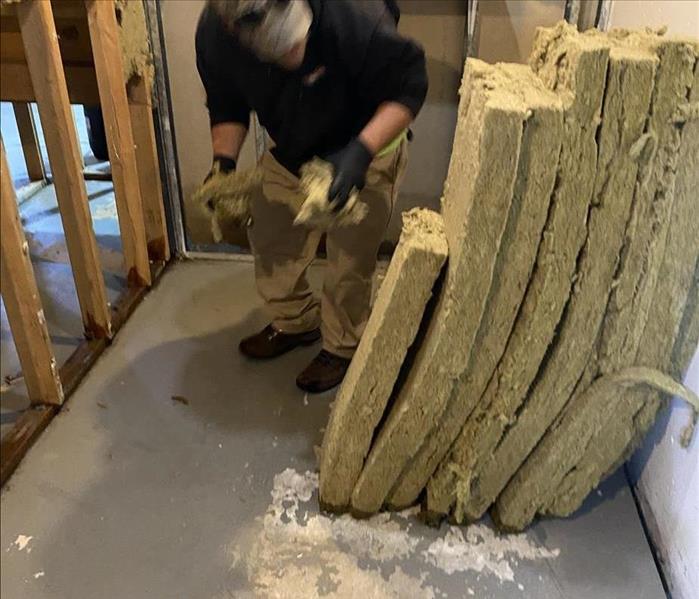 SERVPRO knows exactly what to do after fire damage. Our emergency restoration team follows all of the important steps in fire damage restoration.
SERVPRO knows exactly what to do after fire damage. Our emergency restoration team follows all of the important steps in fire damage restoration.
Experiencing a fire in your home or business can be a traumatic and overwhelming event. In addition to the initial shock and devastation, the aftermath of a fire can leave behind extensive damage to your property. However, with the help of professional fire recovery services, such as those provided by SERVPRO's Florida Fire Restoration team, you can navigate the fire damage restoration process and restore your property to its pre-fire condition. In this blog, we will outline the important steps involved in the fire damage restoration process.
1. Immediate Assessment and Inspection
The first crucial step in the fire damage restoration process is the assessment and inspection of the affected property. A professional fire damage assessment is conducted to determine the extent of the damage, identify safety hazards, and develop a comprehensive restoration plan. During this phase, experienced technicians evaluate the structural integrity of the building, assess the extent of smoke and soot damage, and identify areas that require immediate attention.
2. Board-Up and Roof Tarp Services
After a fire, your property may be left vulnerable to further damage from the elements, unauthorized entry, or vandalism. To mitigate these risks, professional fire recovery services often include board-up and roof tarp services. Temporary boarding and roof tarping help secure the property, prevent additional damage, and provide essential protection until the restoration process begins.
3. Smoke and Soot Removal
Smoke and soot residues are common after a fire and can spread throughout the property, causing extensive damage. Professional fire cleanup services involve the thorough removal of smoke and soot from affected surfaces, including walls, ceilings, furniture, and belongings. Advanced cleaning techniques and specialized equipment are used to effectively eliminate smoke odors and soot residues, preparing the property for the next stages of restoration.
4. Water Damage Mitigation
In many fire incidents, water damage resulting from firefighting efforts is also a significant concern. Water can saturate building materials, furnishings, and personal belongings, leading to potential mold growth and structural issues. Fire damage restoration services often include water damage mitigation, which involves extracting excess water, drying and dehumidifying the affected areas, and addressing any moisture-related issues to prevent further damage.
5. Structural Repair and Reconstruction
Once the initial mitigation steps are completed, the focus shifts to structural repair and reconstruction. This may involve repairing damaged walls, floors, ceilings, and other structural components, as well as restoring electrical, plumbing, and HVAC systems. Professional fire remediation services encompass comprehensive structural repairs, ensuring that the property is restored to a safe and functional condition.
6. Content Cleaning and Restoration
Personal belongings and contents affected by the fire and smoke require specialized attention during the restoration process. Professional fire recovery services encompass content cleaning and restoration, which may involve pack-out, cleaning, deodorization, and restoration of items such as furniture, clothing, electronics, and sentimental possessions. Advanced restoration techniques are utilized to salvage and restore as many items as possible.
7. Odor Elimination and Deodorization
Persistent smoke odors can linger long after a fire, affecting indoor air quality and the comfort of occupants. Professional fire damage restoration includes thorough odor elimination and deodorization services. Specialized deodorization techniques, including ozone treatments, thermal fogging, and air scrubbing, are used to effectively neutralize smoke odors and improve the overall indoor environment.
Contact SERVPRO® Expert Fire Damage Restoration
Navigating the fire damage restoration process can be daunting, but with the support of a trusted and experienced restoration company like SERVPRO's team, you can achieve a successful recovery. Their comprehensive fire cleanup and restoration services cover all essential steps in the restoration process, ensuring efficient and effective results.
If you require professional fire damage restoration services, contact SERVPRO’s team for expert assistance. With their industry expertise, state-of-the-art equipment, and dedication to customer satisfaction, they are equipped to handle the complexities of fire damage restoration, leading you through a smooth and successful restoration journey.
Unveiling the Mold Remediation Process: A Comprehensive Guide
6/19/2024 (Permalink)
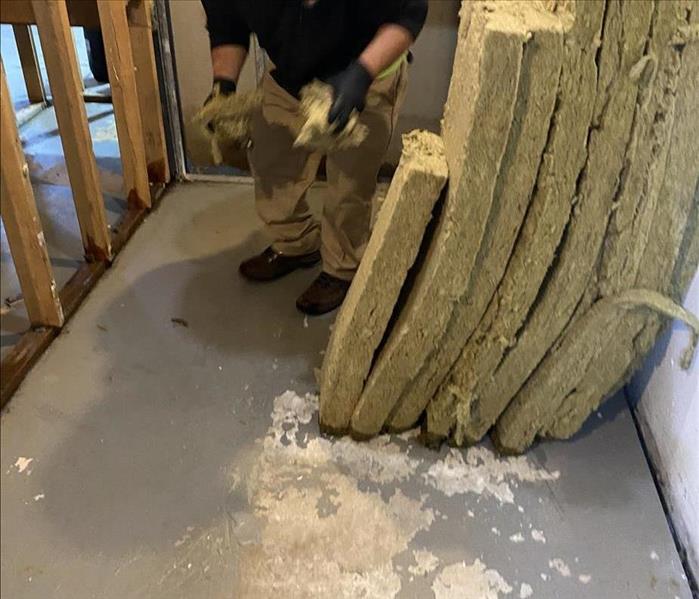 At SERVPRO, we understand the urgency and importance of mold remediation, which is why we're here to shed light on the process of tackling this issue.
At SERVPRO, we understand the urgency and importance of mold remediation, which is why we're here to shed light on the process of tackling this issue.
Mold is a silent intruder that can wreak havoc on your property, causing damage to both your home and belongings if left unchecked. At SERVPRO®, we understand the urgency and importance of mold remediation, which is why we're here to shed light on the intricate process of tackling this pervasive issue.
Understanding the Nature of Mold
Before delving into the remediation process, it's crucial to comprehend the nature of mold. Mold spores are omnipresent, lurking in the air both indoors and outdoors. However, when they find moisture and a suitable environment, they proliferate, forming colonies that can rapidly spread throughout your home.
Assessment and Inspection
The first step in mold remediation is a comprehensive assessment and inspection by our experienced technicians. Using state-of-the-art equipment, we identify the extent of the mold infestation, pinpointing affected areas and determining the underlying cause of moisture.
Containment
To prevent the spread of mold spores to unaffected areas, containment is imperative. Our team utilizes advanced techniques such as negative air pressure chambers and physical barriers to isolate the contaminated zones, minimizing the risk of cross-contamination.
Moisture Elimination
Addressing the source of moisture is paramount in halting mold growth. Whether it's a leaky pipe, roof damage, or poor ventilation, we employ specialized equipment to eliminate excess moisture, restoring the optimal humidity levels in your home.
Removal of Mold-infested Materials
Once containment measures are in place and moisture levels are controlled, our technicians proceed with the safe removal of mold-infested materials. From drywall and carpeting to insulation and furniture, we meticulously remove and dispose of affected items in accordance with industry standards.
Cleaning and Disinfection
After the removal of mold-infested materials, thorough cleaning and disinfection are essential to eradicate any remaining mold spores. Our team utilizes powerful antimicrobial agents and cleaning solutions to sanitize surfaces, ensuring a mold-free environment.
Drying and Dehumidification
To prevent mold recurrence, thorough drying and dehumidification of the affected area are paramount. We deploy industrial-grade air movers and dehumidifiers to expedite the drying process, restoring your property to its preloss condition.
Post-Remediation Verification
Once the remediation process is complete, we conduct a final inspection to ensure that mold growth has been effectively eradicated. Our goal is not just to remove visible mold but to address the root cause and provide long-lasting solutions for a mold neutral indoor environment.
At SERVPRO, we prioritize professionalism, efficiency, and customer satisfaction in every mold remediation project. With our expertise and cutting-edge techniques, you can trust us to restore your home to a safe and mold-free condition. Don't let mold take control of your property – contact us today for comprehensive mold remediation services!
How Restoration Professionals Assess Structural Water Damage: A Comprehensive Approach
6/6/2024 (Permalink)
Water damage can have a significant impact on both residential and commercial properties. Whether caused by floods, leaks, or burst pipes, water intrusion can lead to structural damage that may compromise the integrity of a building. Restoration professionals like SERVPRO of North East Chester County play a crucial role in assessing and addressing structural water damage to ensure the safety, stability, and longevity of a property. In this blog, we'll explore how restoration professionals assess structural water damage in both residential and commercial settings and the steps involved in the process.
Initial Assessment
Restoration professionals begin the assessment process by conducting a thorough initial inspection of the affected property. They identify the source and extent of the water damage, documenting all visible signs such as standing water, moisture-soaked materials, and discoloration. This initial assessment helps determine the urgency of the situation and guides the next steps in the restoration process.
Use of Advanced Tools
Restoration professionals use advanced tools and equipment to accurately assess water damage and locate hidden moisture. Moisture meters, thermal imaging cameras, and hygrometers are commonly used to measure moisture levels in walls, ceilings, floors, and other structural components. These tools provide precise data that helps professionals pinpoint areas of concern and assess the overall extent of the damage.
Structural Integrity Evaluation
Once moisture levels have been measured, restoration professionals evaluate the structural integrity of the building. This includes checking for signs of structural compromise such as sagging ceilings, warped floors, and weakened beams. In commercial properties, professionals also assess the impact of water damage on load-bearing walls and support columns, which can affect the safety of the entire building.
Documentation and Reporting
Restoration professionals document their findings throughout the assessment process, including photographs, moisture readings, and written reports. This documentation is essential for supporting insurance claims and providing a clear record of the damage for property owners. Detailed reports also guide restoration efforts by outlining the scope of work needed for repairs.
Development of a Restoration Plan
Based on the assessment, restoration professionals develop a comprehensive restoration plan tailored to the specific needs of the property. This plan includes drying and dehumidification techniques, structural repairs, and any necessary demolition and rebuilding of damaged areas. In commercial properties, restoration professionals may also coordinate with property managers and business owners to minimize downtime and disruption.
Collaboration with Other Experts
Restoration professionals often collaborate with other experts such as engineers, architects, and contractors to ensure a comprehensive approach to structural water damage. This collaboration helps address complex challenges and ensures that repairs and restoration are carried out safely and efficiently.
Communication with Property Owners
Throughout the assessment and restoration process, communication with property owners is key. Restoration professionals keep property owners informed about their findings, recommended actions, and progress. Clear communication helps property owners understand the severity of the damage and the steps needed for successful restoration.
Restoration professionals play a vital role in assessing and addressing structural water damage in both residential and commercial properties. Through initial assessments, advanced tools, structural evaluations, documentation, restoration planning, collaboration with experts, and clear communication, SERVPRO of North East Chester County ensures that properties are restored safely and efficiently. By entrusting water damage assessments to experienced restoration professionals, property owners can protect the structural integrity of their buildings and minimize the impact of water damage on their homes or businesses.
 Water damage can happen unexpectedly in Chester County, PA, whether from a burst pipe, appliance malfunction, or heavy rain.
Water damage can happen unexpectedly in Chester County, PA, whether from a burst pipe, appliance malfunction, or heavy rain.




 24/7 Emergency Service
24/7 Emergency Service







